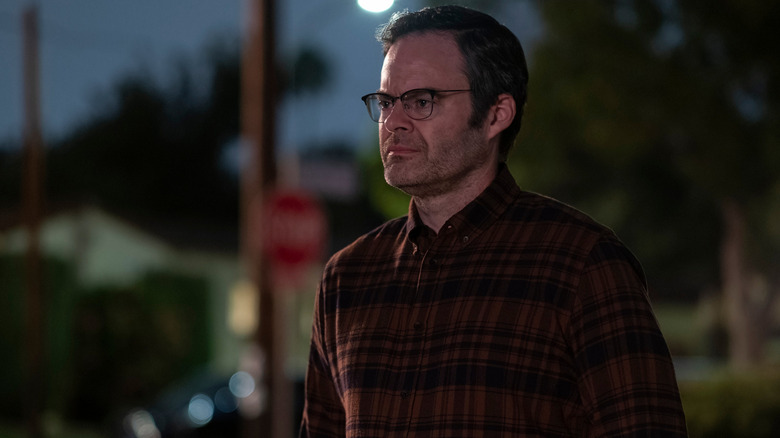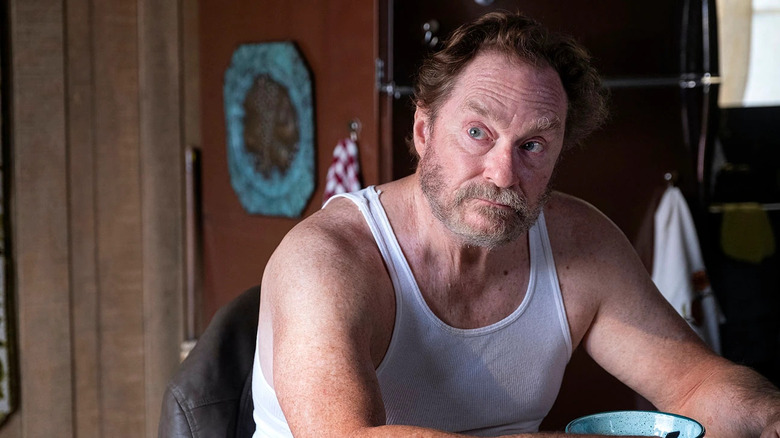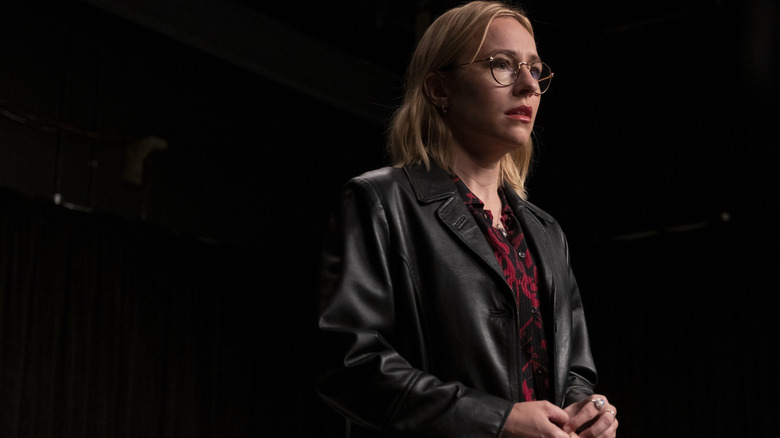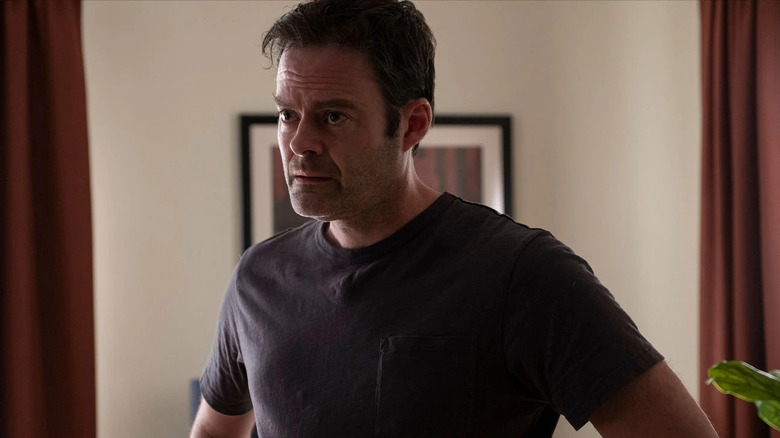In Its Ironic Way, Barry Finally Proved People Can Change
This article contains spoilers for the "Barry" series finale.
"If I can change ... and you can change ... everybody can change!!!" Of course, those were the immortal words uttered by boxing champ Rocky Balboa in 1985 when he solved the Cold War (citation needed), yet they're also words that resonate for the characters in HBO's "Barry."
When the series (which just ended its run with the final episode of its fourth season) began in 2018, it seemed to be the tale of Barry Berkman (Bill Hader), an ex-Marine turned assassin-for-hire who was looking to escape his existence of dread and death and found a guiding light in the form of acting. Brought into the Los Angeles struggling actor fold by teacher Gene Cousineau (Henry Winkler) and fellow student (and later girlfriend) Sally Reed (Sarah Goldberg), Barry believed that true change was possible via working out his deep-seated trauma and mental issues on stage.
Of course, this was a horribly misguided notion, and the show — co-created by Hader and Alec Berg, with Hader directing the entirety of the fourth season — made sure to teach Barry and the other characters that lesson the hard way. Up until the very end of the series, it seemed that the thesis of "Barry" is that a tiger ultimately cannot change his stripes, that everyone has a true nature which must be served.
Yet the finale of "Barry" (entitled "wow") pivots at the last minute, demonstrating quite slyly that huge changes had in fact been made by the characters over the course of the series' eight-year time jump, and if that wasn't enough, the events of "wow" show how the capacity for lasting change exists. However, it doesn't mean that everyone gets to achieve it, or if they do achieve it, that it was the truth or even their choice.
Hank and Fuches: Into the light of the dark black night
Perhaps the most surreal moment in "wow" is the standoff between the muscle-bound, gun-toting gangs led by Noho Hank (Anthony Carrigan) and Fuches, aka The Raven (Stephen Root). It's a little shocking to see Hank, once a bright ray of positivity and sunshine on the series despite his criminal underworld existence, so filled with grief and rage over his role in the murder of the love of his life, Cristobal (Michael Irby). It's equally as bizarre to see the slippery, black-hearted weasel Fuches be so sexy and badass as The Raven.
If that wasn't enough to indicate how much both characters had changed, writer and director Hader gives each man a pivot point during their confrontation. The Raven, after running through a litany of his many flaws, offers Hank a new deal: he'll walk away if Hank will admit to allowing Cristobal's murder. Hank breaks down and seems about to finally face his responsibility and grief, but backs off at the last second, declaring Fuches a liar, resulting in the mutual destruction of both crews before a vengeful Barry ever arrives. Hank dies slowly, in pain and in fear, holding the bronzed hand of the statue he made of the lover he murdered.
The Raven, having survived the slaughter, finds his own pivot point when he decides to take Barry's son, John (Zachary Golinger), and sets him free to Barry, no strings attached. After sharing a meaningful look with his old surrogate son/protegé, The Raven vanishes into the night, having finally done a selfless deed.
Sally and John: Curtain call
In a prior piece about the series, I discussed how "Barry" was a show chronicling a series of toxic relationships, and not only do Sally and John have a toxic relationship with Barry, they have one with each other, too. Just two episodes prior to the finale, in "the wizard," a drunken Sally drugged an anxious John to make him sleep, a trick that worked only too well, leaving both of them vulnerable to a violent home invader.
In a moment that echoes Fuches' later honest assessment of himself, Sally tearfully apologizes to John while they're being held by Hank, assuring the boy that he's "a good person" while calling herself "a bad mother." John unconditionally hugs his mom, giving the deeply wounded Sally enough absolution to finally embrace her son with the same affection.
After they're saved from the gang fight by The Raven, Sally (who, before she and John were kidnapped, barely took care of her son) takes John with her in escaping Barry's manipulative and delusional clutches. Several years later, Sally is happily teaching drama and directing plays at a high school and is receiving her flowers for her work (literally). When approached by a nice yet insistent fellow teacher for a date, Sally simply and unequivocally turns him down, strong enough now to not fold for a man out of a need for validation.
John (played in his teen years by Jaeden Martell), meanwhile, can't resist a friend showing him the biopic made about his infamous dead father, and the opportunistic, highly inaccurate exaggerations and fabrications in the movie-within-the-show may be apparent to us the audience, but to John they serve as his own absolution, allowing the hero worship of his dad that he grew up with to be confirmed.
Barry and Gene: Trapped in the spotlight
While Sally, Barry and Gene all had naked ambition to make it big in showbiz, it was Sally who actually had something to say in addition to desiring the spotlight. That's not the case for Barry or Gene; the former saw the film and television industry as another thing he was savant-like good at (and therefore deserved success in, according to his skewed, selfish philosophy and/or religion), while the latter gladly stepped over anyone and everyone — including his own dignity — to achieve a crumb of fame.
Before Sally takes John and leaves, Barry convinces himself that God must want him to escape and not take responsibility for his actions by turning himself in while Gene is erroneously on trial for the murder of Janice (Paula Newsome). God, of course, works in mysterious ways: looking for his family, Barry arrives at Gene's home, where unbeknownst to him, the former acting teacher is doomscrolling the internet and seeing article after article with his name in them for the worst possible reasons.
Gene's slimy lawyer, Tom (Fred Melamed), makes a surprising plea to Barry to turn himself in, and Barry finally has his own pivot point, a moment of clarity in which he makes the decision to do just that. As the show (and Hader himself) continually points out, though, Barry is not allowed to become a hero — Gene enters and shoots Barry dead, point blank, becoming the murderer the articles have declared him to be.
As the cheesy biopic (entitled "The Mask Collector") that a teenage John later watches states, Barry Berkman was manipulated by the criminal sociopath Gene Cousineau to commit murders and crimes that he steadfastly refused to, died after being shot by the mastermind killer Gene (who is now serving life in prison), and is buried with honors at Arlington National Cemetery — a hero's burial. "Gene" and "Barry" finally get to star in a movie, and they've been forever changed, if only in the public eye. In this way, change in "Barry" is like a force of nature: it comes no matter what, and people can either utilize its power or be decimated in its wake.



